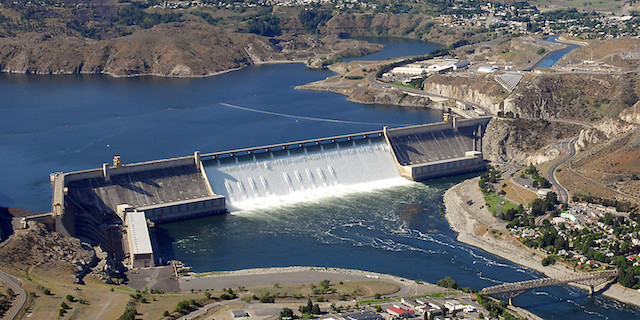Agencies cancel re-do of Columbia River system environmental impact statement
Published 10:30 am Thursday, July 3, 2025

- The Grand Coulee Dam on the Columbia River. The U.S. Army Corps of Engineers and the Bureau of Reclamation are withdrawing from their plan to prepare a supplemental environmental impact statement for the Columbia River system. (Courtesy Bureau of Reclamation)
The U.S. Army Corps of Engineers and U.S. Bureau of Reclamation are withdrawing from their plan to prepare a supplemental environmental impact statement for the Columbia River system.
The withdrawal notice is slated to be published in the Federal Register July 7. An unpublished form is available on the Federal Register website at https://public-inspection.federalregister.gov/2025-12604.pdf
Tom Conning, Corps spokesman, declined to comment.
Trending
The withdrawal follows President Donald Trump’s revocation of the federal agreement made to restore native salmon and steelhead under the Biden administration in December 2023.
That agreement was with the Nez Perce Tribe; the Confederated Tribes and Bands of the Yakama Nation; the Confederated Tribes of the Umatilla Indian Reservation; the Confederated Tribes of the Warm Springs Reservation, several environmental non-government organizations and the states of Oregon and Washington.
The agencies originally announced their intent to supplement the 2020 Columbia River Systems Operations environmental impact statement, or CRSO EIS, in December. They intended to review new information and circumstances since the 2020 EIS was published, including:
• Changes to operations, maintenance and configuration of the 14 projects in the Columbia River System.
• New species that have been listed or proposed for listing under the Endangered Species Act, such as the wolverine.
• New reports, studies or other information published since the CRSO EIS was completed.
The Columbia Basin Regional Alliance for Transparency (RAFT), a coalition of regional power, navigation and agricultural organizations, asked the federal government in December to withdraw, calling a new analysis “premature and unlawful.”
‘Necessary course correction’
“This decision marks a necessary course correction,” said Neil Maunu, executive director of the Pacific Northwest Waterways Association. “The commitments made in the original [memorandum of understanding] – developed without our participation – set a predetermined path toward breaching the four lower Snake River dams, an outcome we firmly oppose. We appreciate the administration’s acknowledgement of the flawed assumptions underlying both the MOU and the supplemental EIS process.”
Trending
The association’s Inland Ports and Navigation Group remains committed to advocating for an “inclusive, science-based and equitable process” moving forward, Maunu said.
The supplemental EIS would have been a duplicative process, as the joint Record of Decision on the 2020 CRSO EIS determined breaching the dams is not the answer, said Michelle Hennings, executive director of the Washington Association of Wheat Growers.
“We look forward to continuing to work with our federal government partners to ensure the dams remain intact, while preserving the livelihoods of salmon and river users.”
“The process used to develop the [Dec. 2023] agreement … was deeply flawed from our perspective, and only a fraction of impacted sovereign entities had a seat at the table,” said Austin Rohr, deputy executive director for Northwest RiverPartners. “The agreement did not take a holistic approach. Rather, it only focused on select challenges that those in the room prioritized.”
Rohr called for a “sustainable path forward.”
“It’s important that everyone has a voice and can work toward solutions and compromises that ensure a stable energy system for our region,” he said.
Extended comment periods
The agencies extended several comment periods as part of the EIS re-do, with an original deadline in March, then May. The delays allowed more time to assess changes to the National Environmental Protection Act process under the Trump administration and seek “more informed feedback” from the public, the agencies said at the time.
The agencies received thousands of form letters during the comment period.
“Those are fine, but they’re treated as one comment,” Conning told the Capital Press in May. “We need substantial comments that give us supporting evidence, questions, assumptions, provides new information. Those kinds of things are certainly more helpful than a form letter from thousands of people.”







